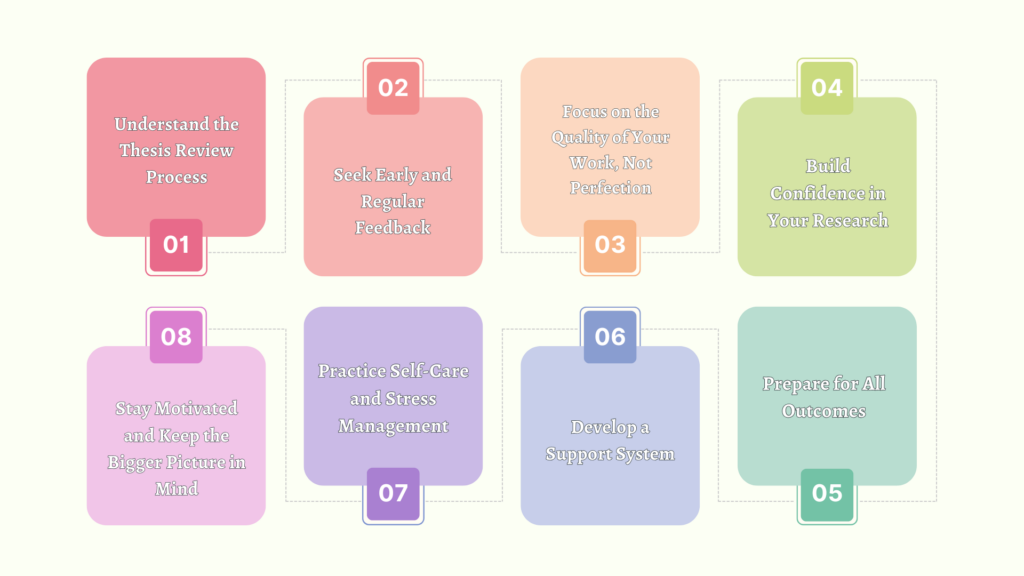How to Overcome the Fear of PhD Thesis Rejection: Tips for Success
Kenfra Research - Shallo2024-12-17T17:15:49+05:30The fear of PhD thesis rejection is a common yet deeply unsettling experience for many doctoral candidates. After years of dedication, research, and hard work, the thought of having your PhD thesis rejected can seem overwhelming. This fear can often cloud your judgment and affect the quality of your writing and research. However, it’s important to understand that rejection is not the end of your journey, but rather a natural part of the academic process. In this blog, we’ll explore practical strategies to help you overcome the fear of PhD thesis rejection and boost your chances of success.

1. Understand the Thesis Review Process
One of the key reasons for the fear of rejection is the uncertainty surrounding the thesis review process. The process can vary depending on your university, department, and advisor, but generally, your thesis will go through several stages of feedback, including initial reviews by your advisor, committee members, and possibly external examiners. It’s important to know that most thesis reviews involve constructive feedback rather than outright rejection. Many PhD candidates receive revisions or requests for clarification before being accepted. Understanding that rejection is not a final decision can help reduce anxiety.
2. Seek Early and Regular Feedback
One of the most effective ways to minimize the chances of rejection is to seek continuous feedback throughout the writing process. Regular feedback from your advisor, peers, and colleagues will give you the opportunity to make necessary revisions and address any weaknesses before submission. It’s better to tackle potential issues early on, rather than discover them during the final submission stage. Ask your advisor for specific guidance on areas that need improvement, and be open to constructive criticism.
3. Focus on the Quality of Your Work, Not Perfection
Perfectionism can paralyze you and heighten the fear of rejection. While striving for excellence is important, it’s essential to remember that no thesis is perfect. Every thesis, no matter how well-researched or well-written, will likely need some revisions. The key is to focus on creating high-quality work that meets academic standards and addresses your research question thoroughly. Remember that rejection is often due to minor issues, such as unclear arguments, missing references, or methodological flaws, which can be easily fixed with revision.
4. Build Confidence in Your Research
One of the most powerful ways to overcome the fear of rejection is to build confidence in your research. Reflect on the amount of time and effort you have invested in your work and recognize its value. If you’ve followed a clear research plan, conducted thorough analysis, and produced solid results, you can be confident in the quality of your thesis. Remember, your research adds something valuable to the academic community, and that is something to be proud of. Confidence in your work will not only help alleviate your fear but also improve your writing and presentation.
5. Prepare for All Outcomes
While no one wants to think about rejection, it’s essential to prepare for all possible outcomes. Rejection doesn’t mean the end of your academic career or failure—it simply means that there are areas that need improvement. If your thesis is rejected, take it as constructive criticism. Your advisors and committee members will provide feedback on how to strengthen your work, and many candidates successfully resubmit after making revisions. Developing a mindset that views rejection as an opportunity for growth will help you stay motivated and focused.
6. Develop a Support System
The journey of writing and submitting a PhD thesis can be lonely and stressful, but you don’t have to go through it alone. Surround yourself with a strong support system, including your academic advisors, mentors, colleagues, friends, and family. Their encouragement, advice, and reassurance will provide emotional stability and help you stay grounded. Having someone to talk to when you’re feeling anxious can make a huge difference in your mental well-being and motivation.
7. Practice Self-Care and Stress Management
The pressure of submitting a PhD thesis can take a toll on your mental and physical health. Managing stress is crucial for maintaining productivity and avoiding burnout. Practice self-care regularly by getting enough sleep, eating well, exercising, and engaging in relaxing activities such as meditation, yoga, or spending time with loved ones. Reducing stress will help you stay focused, calm, and more resilient to the fear of rejection.
8. Stay Motivated and Keep the Bigger Picture in Mind
Finally, remind yourself of the bigger picture. The PhD journey is a long and challenging one, but it’s also incredibly rewarding. Even if your thesis is rejected or needs substantial revisions, this experience is a valuable part of your academic growth. Keep your long-term goals in mind, and remember that rejection is just a small step in the journey toward earning your degree. Stay motivated by focusing on why you started this journey and the positive outcomes that await.
Conclusion
Overcoming the fear of PhD thesis rejection is not an easy task, but it is possible with the right mindset and strategies. By understanding the review process, seeking regular feedback, focusing on the quality of your work, and building confidence in your research, you can reduce your anxiety and increase your chances of success. Remember, rejection is a temporary setback that can be overcome with hard work, persistence, and a positive attitude. With the right support system and self-care practices, you can navigate this fear and successfully submit your thesis.
Kenfra Research explores practical strategies to help you overcome the fear of PhD thesis rejection and boost your chances of success.









Leave a Reply